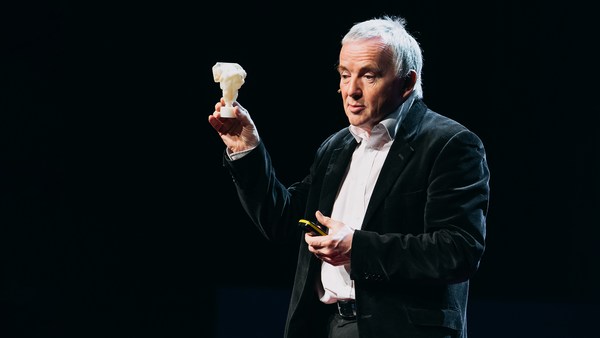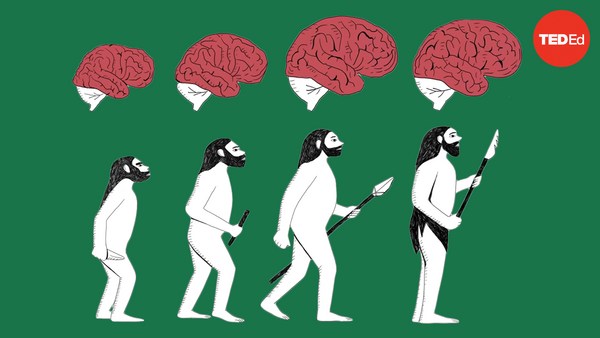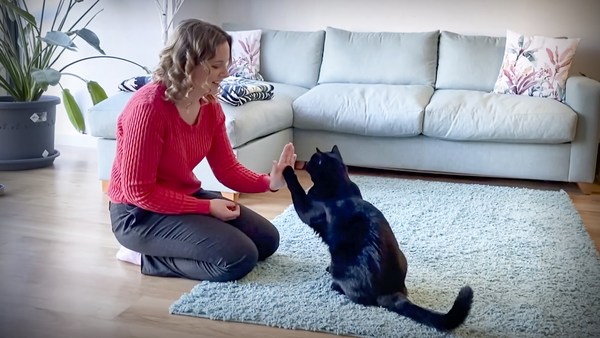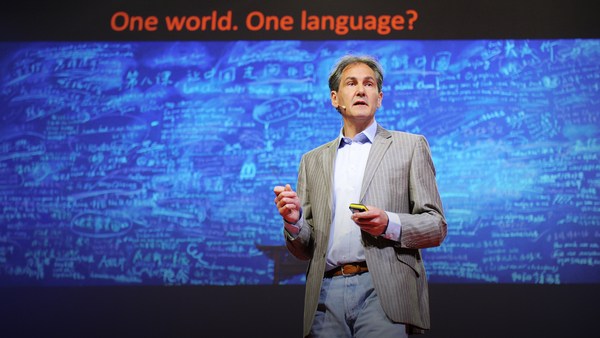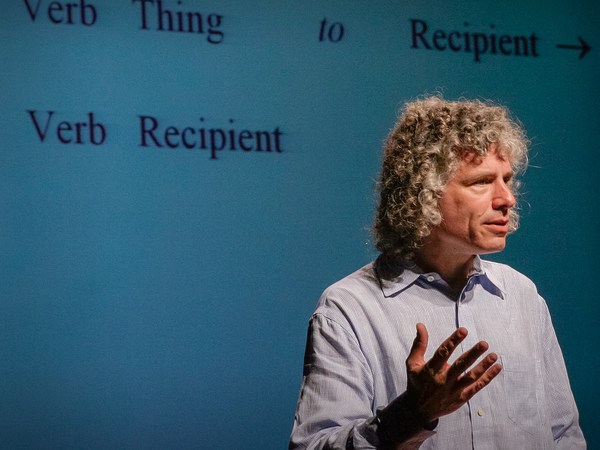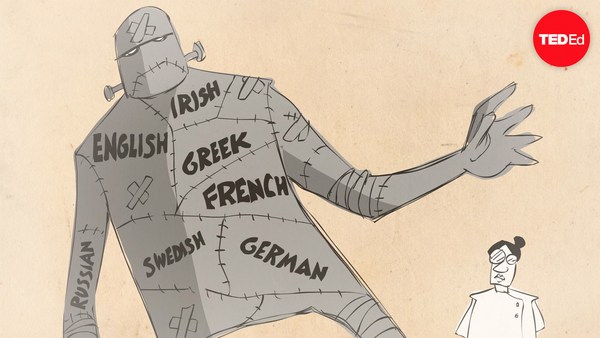John McWhorter: So Richard, let's just get right started, as people say at the beginning of interviews like this. I want to explore, and I think you do, too, the fact that if linguist-me reads “The Selfish Gene,” I'm always thinking, "Oh, this is just like language." And you have an interest in how the evolution of language is similar to the evolution of creatures.
And so just to explore the parallels, the first thing that I've always wanted to ask you is about excess. And so, in any language, any language, the language specifies more things than it needs to. If you speak that language, you think of it as normal, but it isn't.
And so, for example, if you learn about the future tense in English, you're taught that we say "will," "I will buy you some socks." But if you think about it, that's not a sentence. When would you say, "I will buy you some socks?" That would only be at the culmination of an argument. Really, more likely would be “I’m gonna buy you some socks.” Or you could say "I buy you some socks tomorrow," which gives it a sense of event. Or "I shall buy you some socks," which doesn't really mean anything, but yet it's another way of saying it. Our future tense overdoes it.
I've often thought, so much of language really doesn't need to be there. No language needs to be as picky about the future as English. Do creatures, do plant -- “plantures,” do they overdo it in the same way, and if so, why?
Richard Dawkins: I suppose you could say that poetry is something extravagant and overdone. And if I think about the nearest approach to poetry in wild creatures, it might be something like a peacock's tail, where it's far from utilitarian. The idea is that the male is attempting to seduce a female, and there's massive overkill.
JM: There’s too much.
RD: It's too much.
(Laughter)
When Charles Darwin proposed his theory of sexual selection, his co-discoverer of natural selection, Alfred Russel Wallace, didn't like it because he wanted it to be more utilitarian. And Darwin was happy to say simply, it's female whim, females simply like this extravagant thing. This argument wasn't really settled until the 1930s, when R.A. Fisher pointed out mathematically, well, intuitively, mathematically, that if you make certain assumptions, there is a runaway process, an exponential runaway process, as natural selection works upon female taste, genes for female taste getting more and more extravagant, male tails get more extravagant, and this runs away exponentially to produce this ridiculous, extravagant advertisement. There are other theories, but I think that's perhaps the nearest approach, you get to what you want.
JM: And the only thing that could stop it is if the tail became so large that it would interfere.
RD: Eventually, utilitarian considerations will interfere. I sometimes wonder whether -- I think Geoffrey Miller has suggested this -- that it might be that human poetry, epic poems, recitals, singing, is a form of sexual selection and that humans might have evolved the capacity to advertise to the opposite sex --
JM: There’s some of that.
RD: By being virtuoso poets, virtuoso reciters of tribal epic poems, something of that sort. Like like a peacock's tail.
JM: That’s a a pleasing idea, especially for language people. Yeah.
(Laughter)
I have a related question then. A lot of what is in a language is dragged along, like, to use an aging analogy, tin cans dragged along behind a car after a wedding -- I've never actually seen that outside of a cartoon, but it must have happened at some point, probably in the '50s, but that, and so, so much of language is that, for example, in the English language we'll say something like "to dribble." Now that comes from drip. So a drip is just "drip, drip," and then dribble is (vocalizing) like that. Now you think well OK, that's just that one.
But then imagine you are nipping on something. So you just go "wha," like a wolf, nipping. But then nibble is kind of like (vocalizing). And so that "le" means (vocalizing) and we use it in words like giggle and spackle and sparkle. One spark is you get shocked from a fuse that goes out. Sparkle is (vocalizing) like that.
Now, we can't make any new words with "le" anymore. You cannot "walkle" across the stage. It's long dead. Only some ancient Germanic person would have been able to use it. So, it's dead.
Now, the analogy to this, I think, with DNA is junk DNA. Is it true that there is DNA dragged along like that that used to mean something but didn't? Or is that analogy off?
RD: That is true. The phrase junk DNA is rather overused in different ways, but I think what you're talking about is what are called pseudo genes, where they're just dead vestiges, actually. It's a little bit different from your dribble. It's a dead vestige.
And the most interesting example of this is a kind of fossil that's gone, is the sense of smell. As you know, humans have a very poor sense of smell compared to many other mammals.
The interesting thing is that we still have the genes that would make us have that kind of sense of smell. They've just been turned off. So we have a whole repertoire of ancient mammal smell genes. They've just simply been switched off, they're vestiges, they're pseudo genes.
I sort of feel if only they could be turned back on again. We would experience wonderful, exotic perfumes that we cannot imagine. And I can imagine sort of wine connoisseurs would go far beyond the inklings of "lead pencil mixed with blackberry in the satisfying finish," that kind of thing. I mean, that would go way, way beyond if we had all these genes turned on.
JM: Yes it would. But these genes can be turned back. I just thought of an example. This truly is spontaneous, and that’s not my usual -- “le,” “Wordle.” And so, that's not a word. But now it is, we're reusing that suffix. And so it's a cute little "wordy" thing. And so you can kind of bring it alive and maybe there'll be other things ending in "le" nowadays such as your tax "assessmentle" or something.
RD: Have you tried Hardle, by the way?
JM: What’s Hardle?
RD: Hardle, oh, it's wonderful. It's just much more difficult.
JM: It’s “hardler” than Wordle?
RD: Yes.
(Laughter)
JM: That is perfect. Anyway, I have another "Gee, Professor Dawkins" question, which is this: I have been present when you said that there was a way of telling a difference -- this is getting into my thing -- between a language and a dialect. People are always asking a linguist, what's a dialect? What's a language? How can you tell? Is Scots a dialect of English, or is Scots another language?
And you said, and I thought this was very clever, that, you know that someone's speaking a dialect of something else rather than a separate language if, when you speak the dialect, the native speaker either laughs at you or is insulted. They don't see you as doing something important. Whereas if you're speaking Japanese, they're not going to laugh at you, at least when you're there. They are honored that you're trying.
Is there an equivalent to that in telling a difference between species and subspecies, what with donkeys and mules?
RD: If I were to go into a Glasgow pub and say (Speaking in Dutch) I would probably get thumped. But if I were to go into an Amsterdam pub and attempt to speak Dutch, they would be all over me.
JM: They love you, right.
RD: And that's the difference between a dialect and a language. Well, there are two species of frog in North America, Microhyla carolinensis on the east side and Microhyla olivacea on the west side. And olivacea has a higher-pitched call. So that's olivacea with high-pitched call.
JM: (high-pitched sound)
RD: And carolinensis has a lower-pitched call.
JM: (low-pitched sound)
RD: But there’s not much difference between them. Now you might expect that if it was like, you might expect a cline that you would gradually get -- these are very closely related species. As you go from west to east, the call would get gradually deeper and deeper and deeper. That's what you might expect. The reverse happens. It's a reverse cline.
As you get into a zone of overlap, the olivacea call goes up and the carolinensis call goes down so that these creatures are exaggerating the difference between them. So in the zone of overlap, the difference between them is exaggerated compared to where they don't overlap.
This is equivalent to my going into the Glasgow pub and attempting to do a Scots dialect, and being hit.
JM: And being jumped, yeah.
RD: And I think it's probably true. I mean, Dobzhansky had this theory that when new species form, when species, an ancestral species diverges to form new subspecies, and then new species, there is an intermediate and interregnum, when natural selection favors anything to differentiate them, anything to make them sound different or look different or smell different, to exaggerate the difference. And so there is a kind of acceleration of the speciation process.
JM: There are many people who say the same thing about human speech. That people deliberately tried to distinguish themselves from speakers of other dialects for social identification.
RD: "We're not one of those."
JM: Right. I frankly suspect that a lot of that has to do with maybe a small collection of words. I am skeptical that people change their accent on purpose because it's so deeply seated. However, there are other linguists who would counter me on that, and certainly it's true of words that you try to use different, you try to use different words.
RD: Yes, yeah.
JM: So here is another question for you. Natural selection means that creatures' changes are "all" or maybe mostly due to survival. And so the longer neck of a giraffe, presumably, was so that it could reach higher. That helped in terms of getting food. And then there's the okapi, which is a giraffe, that didn't happen to do that.
Now, of course, in language, the way I mainly think of it is that most change in a language -- how you get from Old English (Beowulf), Middle English (Chaucer), Modern English (this) -- is not survival. You know, old English was fine the way it was, Middle English sounded perfectly normal to Chaucer. This to us feels like the only way English should really be. And that's the way it's always been. It's drift. It's just that things happen and you don't know it in your lifetime, and next thing you know, it's a different language. Now there's also drift in natural selection, right?
RD: Well, drift is in a way the opposite of natural selection. Evolutionary change can come about through drift, where there's no selective force, there's no advantage in this gene or that gene. It's just random drift. And that's probably a very important force in evolution. It's not the force that produces interesting things. It's not the force that produces adaptation, that produces better wings, better legs, better voices. But especially if you look at a molecular level, if you look at evolution molecularly, what you see is that changes are neutral. It's rather like changing the font on your word processor from Geneva to Times New Roman. The meaning is the same, but the actual letters are different. So that's an extreme example of drift. And it's very important. But selection is the interesting part of evolution.
And what I wonder is, really putting a question back to you now. Is it all drift in language evolution or is there a ... We could call it memetic selection, where if you think of words as memes, then -- using the word meme in the proper sense, by the way, not the so-called internet meme. Is there a sense in which natural selection, no, not natural selection, a form of selection, favors certain ... What about the Great Vowel Shift, for example? Is it possible that --
JM: Meaning, why the word -- “I made a hat.” Why is it spelled like that? It says “mah-de.” Why do we say “made”? Because the "a" became "e" over time, no one noticed. But that's called the Great Vowel Shift.
RD: OK, so suppose one vowel shifted for some reason. Then that might have caused a necessity for other vowels to shift in order to disambiguate, because there might have been confusion resulting from the first vowel shift. And could the whole series, a cascade of vowel shifts have followed for functional reasons? Disambiguation.
JM: It’s a great idea. Folks, imagine the vowels -- Do any of you have chinchillas? Of course.
So, you put them all in a cage and they’re always kind of moving all around each other. Chinchillas are like vowels. The vowels in your mouth are always kind of moving around.
And yes, there is a such thing as a change shift where it almost seems like the language is trying to keep things clear. That's a weak force, but just as often, the vowels fall together and create homonyms that give you trouble. Or a very typical language thing. I'm sitting here, I'm flying by the seat of my pants, and so unfortunately, I'm going to have to go into a weed.
Here's the weed. There are languages spoken in northeast Siberia. I'm not even going to give their name, but that's where it is. And think about in English. So we have: what, where, why, when. All of them begin with “w.” You kind of like it that way, it makes them easier to learn. All of those question words.
In these northeastern Siberia languages, you have a series of words like that 5,000 years ago that all begin with "k" and they all feel alike. The "k" dropped off because the first sound in a word might drop off, like you say “Wuz that?” instead of “What’s that?” They all dropped off.
And so that means that in those languages now, instead of “what, where, when, why,” it’s “ut, ere, en, i,” like that. They're not as clear, they're not as learnable. They're all screwed up.
That kind of thing happens every bit as much as things that help make things clearer in language. And nobody minds, because by the time a child grows up with it and realizes that there's something off about it, it's too late to learn anything else. And so I feel like language changes maybe "randomer" than creature change.
RD: What I don't understand is why North Americans don’t differentiate between “can” and “can’t.”
JM: Because we don’t have to.
RD: You do because they're the exact opposite of each other.
JM: But context takes care of so much, and so we just suffer.
RD: OK, well, we'll have to agree to differ about that. Look, I want to ask you. I want to challenge something.
JM: (French) Me? OK.
RD: Proto-Indo-European, supposed to be the ancestor of a very large number of languages. All European languages except Basque and several Indian languages.
JM: The music for it is (Vocalizing trumpet) That's Proto-Indo-European. It's in what is now Ukraine. Continue.
RD: Well, in evolutionary biology, it is a fact that if you take any two animals you like, like, for example, you and a kangaroo, there is a single individual animal, which is the most recent common ancestor of you and a kangaroo, and that's an individual. I literally mean an individual. There was a, a mother animal looked a bit like a shrew or something like that, which had two children playing together in the dust, and one of those children became the ancestor of humans, and the other of those children became the ancestor of kangaroos. That is literally true. An individual.
Now I suspect that linguists suffer from, well, you've heard the phrase physics envy. Academic disciplines that envy physicists. Well, I suspect that linguists envy biologists this ability to trace back to a single ancestor. I don't think there was such a thing as Proto-Indo-European in that sense. I suspect that -- I suspect that it was never -- well, of course there was. But the idea that there was a single language which then spread by some kind of mysterious influence all over Europe and the Indian subcontinent, it would have been a hybrid of some sort, as I believe we could say English is because English is a mixture of Germanic and Romance languages. I bet Proto-Indo-European was a hybrid in the same way. And it's ... It's biology envy that makes linguists try to trace back to a single --
(Laughter)
(Applause)
JM: We do have that envy. I wake up with it daily. But ...
(Laughter)
You were correct about Proto-Indo-European. We'll never know exactly. But no doubt it was shot through with probably words and grammar of other languages. My best guess would be languages spoken today in the Caucasus Mountains, for one. Certainly there's no reason why not, because the people were always conquering each other and mating and mixing together. It had to happen. And so no, there was no pure Proto-Indo-European.
And I'll give you even more, it's becoming clearer that Indo-European is many, many languages, several dozen languages. It's becoming clearer that they trace back to at least two different dialects of Proto-Indo-European. I won't go further than that. And it's clear that there's that. And all languages are hybrids to an extent.
However, I would say that there would, theoretically, have been some one Proto-Indo-European language that was mixed, that became the other ones, and there was constant mixture, kind of like, if I may, the way you talk about the life of a gene, which is snaking through all sorts of various creatures such that it's hard to say exactly, and tell me if I'm getting this wrong, that there was this proto kangaroo and this proto marsupial, and then a proto placental, and then there was just one shrew. My impression was that maybe there were other shrews that contributed genes to both of those strains, as things went through.
RD: In previous generations. All that I said was that you can trace back to a single common ancestor. Admittedly, you can go back before that. And then of course, genes will come in from everywhere.
By the way, in bacteria, it's quite different. In bacteria, it's much more like, I think of language, where you really do have cut and paste going on all the time between bacterial genomes.
JM: We can assume there’s always been mixture, the pure language would have been spoken for about ten minutes, probably somewhere in Africa, above what is now the Sahara, maybe in East Africa. After that, once you have more than one, there would have been hybridity between the two. There was always mixture as things went along. So basically, yes.
And you know what? Richard, I think that we have reached the limit of our time. Which is unfortunate because I could do this until I expired. But we have limited time. And so thank you very much for being here to allow me to live out one of my life's fantasies. This was wonderful.
RD: Thank you very much.
(Applause)
